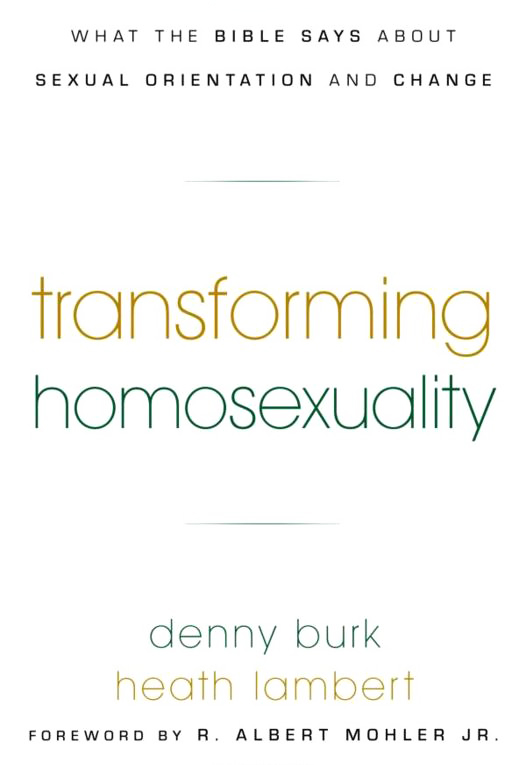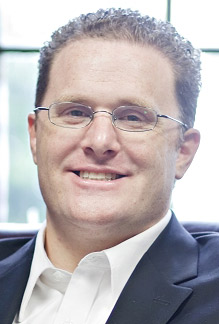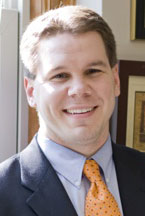
LOUISVILLE, Ky. (BP) — The Gospel demands change for homosexuals just as it demands change for all people, two Baptist collegiate professors write in a new book, “Transforming Homosexuality: What the Bible Says About Sexual Orientation and Change.”

Burk and Lambert are faculty members at Boyce College, the undergraduate school of Southern Baptist Theological Seminary in Louisville, Ky.
Burk, professor of biblical studies, and Lambert, visiting professor of biblical counseling who also is executive director of the Association of Certified Biblical Counselors, acknowledge that homosexuality can be an uncomfortable subject to talk about amid the championing of the Bible’s clear standards for sexuality.
 In an examination of Ephesians 5, Burk and Lambert challenge readers to consider the depth of their sin and to “humbly confess this reality” as “the only way to experience the full, saving love of Jesus Christ.”
In an examination of Ephesians 5, Burk and Lambert challenge readers to consider the depth of their sin and to “humbly confess this reality” as “the only way to experience the full, saving love of Jesus Christ.”
“In place of sexual immorality, impurity, and covetousness, [the apostle] Paul tells us to put on thanksgiving,” the authors note. “As same-sex attracted men and women walk the path of repentance toward change, one of the most practical things they can do is to be thankful…. Be thankful for God’s unflinching purpose to make you like Christ…. God will never waste your struggle. He is sanctifying you. Be grateful.”
The goal for a person who struggles with same-sex attraction is not opposite-sex attraction but to “seek to honor Jesus with their sexuality,” Burk and Lambert write.
 Sin is not only a choice, but it is part of being human; it is innate to people’s fallen nature and their distortion as image bearers of God.
Sin is not only a choice, but it is part of being human; it is innate to people’s fallen nature and their distortion as image bearers of God.
“There is the thought that sin can only be those things that we choose to do. And that’s a misunderstanding of the way the Bible talks about sin,” Burk said in an interview. “We don’t just sin in our deeds but we sin in who we are. Our nature is corrupted by the fall. Sin is not just what we choose, it’s what we are, and so the choices that we make and sometimes the things we do emerge rather spontaneously from our nature.”
This truth is “foreign to people who are thinking in your standard ‘Well, if I didn’t mean to do it, it can’t be a sin’ or ‘If I was born feeling this way, it can’t be a sin’ or ‘If it feels natural, it can’t be a sin,'” Burk continued.
“Scripture teaches that there are a lot of things that feel natural to us that are sinful, and so we’re not really saying anything new in this book…. It’s the doctrine of original sin, now being applied to the issue of sexuality.”
Lambert said, “Christians talk about sin, we talk about sinful behavior, we talk about sinful desires, but we also are the people who are never allowed to talk about sin without talking about the grace of Jesus.
“We also are the people who understand that all of the sins that everyone struggles with out there are the same sins that people struggle with inside the church house,” Lambert said. “These people are in our number, and the grace of Jesus is available to them.”
Jason Allen, president of Midwestern Baptist Theological Seminary, in a review of Transforming Homosexuality, wrote, “At just over 100 pages and pastoral in tone, the book is easy to digest, while offering a clear and biblical overview of issues pertaining to homosexuality, temptation and sanctification.
“After defining sexual orientation and surveying the four approaches to same-sex attraction (liberal, revisionist, neo-traditional and traditional), the authors get to the central concern of the book: Is same-sex attraction in and of itself sin?”
Chapter 2, Allen wrote at his jasonallen.com website on Feb. 11, is “worth the price of the book. The authors biblically, theologically, historically and pastorally make the case that when one experiences same-sex temptation as a lustful impulse, even before acting on that sin, it is an occasion for repentance.”
Pastors “tend to err in one of two directions when counseling someone with same-sex temptations,” Allen reflected. “The first is to suggest that regeneration immediately and completely eradicates lustful patterns. This is not true for lustful heterosexual attraction. Why would it be true for lustful same-sex attraction?
“Those wrestling with same-sex attraction will experience transformation at conversion and can know spiritual growth through the work of the Holy Spirit. But conversion is not a sexual disinfectant. Repentance, accountability and the spiritual disciplines lead believers closer to Christ regardless of the sin pattern, including those experiencing same-sex attraction.”
The other error, Allen wrote, “is to suggest that the Gospel does not transform, and that one cannot know freedom from the power and practice of sin, including same-sex attraction…. To suggest one cannot experience victory over same-sex temptation is to understate the power of the Gospel and the efficacy of the means of grace in the life of the believer.”
Pastors “must strive to be balanced,” Allen wrote. “We must point all sinners, regardless of the pattern of temptation, to the power of the Gospel and the hope it offers. By God’s grace, sinners can, should and will change. But we will not know perfection this side of glory.”















